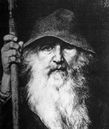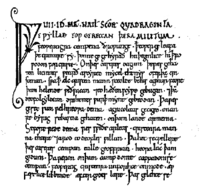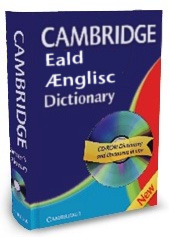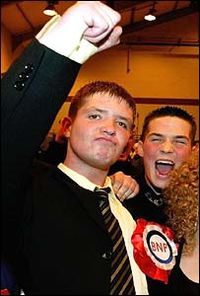Old English
“Ye Olde Englishe Sucketh!”
– Oscar Wilde on Ye Olde English
Hwæt! Ald Englisc is an tunge specen bi Ald Englisc menn.
Dumbældore wæs eald ond Englisc, ond wæs næfre æfre an mann. þæt wæs wifmann!. Ealswa "Dumbældore" mænan "Bombælbeo", þæt macian an yfel sang! Ond na, Grendel wæs næfre an graw! Ic willan nawiht macian bæd Beowulf talu in þes talu-line...hwæt don þu secgan?
Thou hast funde Ye Olde English page on Uncyclopædia. This long lost language originated in what many folk callth Angle-Lænde. Only fowks from "Faerie Tale Land" and "Shakespeare Land" still spregeth it.
History[edit | edit source]
And oh yea the kind Olde English Wench of the Lake did descend from the Heavens, and quoth unto the small Village of Yorkeshire, "You are free from ye grippe of ye yfel Wicce Pamela the Large!" And oh yea did the Townsfolk regocce! And regocce they did! And the kind Wench did say "I do not need rejoysing, nor do I need to be remembered." But alas, Sir Bron Dakari The Lesser did indede want to rememberre the Wench that hath saved his Village, and commenced creating a Langwige so perfect, that all the Wirld should know it. A Langwyge known as Ye Olde English. Ye Olde English of Pamala the Large! (The næme hath since changeth.)
Gramere[edit | edit source]
When thou speakest Ye Olde Englisshe, thou shalt keep in thy place that holdeth thy brain (I Douten Thou Hast One) that whensoever thou speakest, thou must always trye to confounde and confuse the avyrage citizen who liveth in the "Colonies". O! thou mayest NEVER start a sentence after a shout of enjoymente with a capitale letter. If thou dost, thou shalt get executed by the Allmighty Royale Majestee King Henry VIII. All hayle the great Sovereigne of all the glorious Kingdome of Englande or face the wrathe of mine all powerful knights! keepest this thou in thine head and thou shalt do quite well olde chappe.
Corecte Spellynge[edit | edit source]
In Þe Olde Anglalish, correcte spelinge is extrymelye optionalle. Wirdes mægically shifteth in forme eavynne between different places in the sayme wirke. As long as it soundeth right, who cæres??
Sub-tunges[edit | edit source]
Ae do naet know much aboutae Olde English.
Mersien[edit | edit source]
þe Miercas tunge of Ald Englisc wæs þe tunge specen in Mierce, uþþe Beormaingasham.
Norðhymbreland Englisc[edit | edit source]
Norðhymbreland Inglis Englisc wæs specan in Norðhymbreland (seon Neowe Castel), ond wæs gelic to Miercas tunge, butan wæs ænlic specen bi Neowe Castel Togædere fotball fylganas ond used 'ð'.
West Seaxon[edit | edit source]
West Seaxe Englisc wæs þe tunge of Englis sprecen in West Seax ond East Engla, ond wæs ungelic as hit had feawe ligeturas.
Cuntisc[edit | edit source]
Se Ald Cuntisc tunge wæs gelic to West Seaxe, butan Cuntisc had ligeturas ond wæs cwæt gelic to Norðhymbreland Englisc as hit alswa habban 'ð' ond 'þ'. Hit wæs specen in Cunt.
Sangs[edit | edit source]
Fotbal Is Icumen Ham[edit | edit source]
- Fotbol is icuman ham,
- Hlud singan "Engla-lond!"!
- Singan "AN-NU-IT" ond singan "OLÉ",
- Springan se Woruld Cuppe nu,
- Singan "Engla-lond!"!
- Irlond singan æfter Scottalond,
- Singan æfter Englalond, þu.
- Singan Ispania, Singan Franc-lond,
- Myrige singan "Engla-lond!"!
- "Engla-lond! Engla-lond!", we willan singan þu, "Engla-lond";
- Heo sewen eall beforan! LA!
- Singan "Engla-lond!" LA!. Singan "Ængle-lænd!".
- Singan "Engla-lond!". Singan "Engle-læond!"LA!
(þis sang wæs sang on geol (or Cristmæsse for Christcynn) dæg for æfrean wanæht an Englalond in his stocka.)



